Gram Lermond,
loved by all
Annie was nearly awake. She heard a voice
speaking to her, “Mrs. Lermond, Mrs.
Lermond.”
Whose voice was this? No one called her
Mrs. Lermond. Her name was Annie Maria.
Papa had always called her “Annie ’Ria.”
What
room is this? Nothing felt familiar.
“Mrs.
Lermond,” the voice again said. “If you’ll
eat some breakfast, we’ll get you up in a
chair to sit in the sun.”
Annie
then remembered that Mildred had brought
her to this place in Rockland, in the
twilight of her life. As she dozed, she
recalled the happy days of her youth on
the hill in Millertown.
Annie
had been born in May of 1882, in
Lincolnville, the only child of Austin and
Callie (Clark) Marriner. She had spent
fun-filled days picking wildflowers and
playing children’s games with her many
cousins.
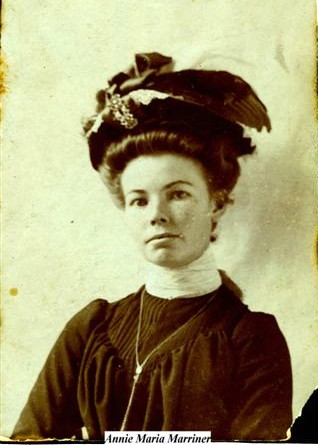 After all, Mamma had been
the youngest daughter of the 11 children
of John and Mary Ann (Clark) Clark. Even
though Papa also had been an only child,
his great-grandfather Naler Mariner, had
been among the early settlers of the town
of Lincolnville, then called New Canaan.
Naler had built a log cabin behind the
present house. Papa had cousins galore,
both in the neighborhood and spread out
across America. After all, Mamma had been
the youngest daughter of the 11 children
of John and Mary Ann (Clark) Clark. Even
though Papa also had been an only child,
his great-grandfather Naler Mariner, had
been among the early settlers of the town
of Lincolnville, then called New Canaan.
Naler had built a log cabin behind the
present house. Papa had cousins galore,
both in the neighborhood and spread out
across America.
Just
down the road lived cousin Effie Miller.
Across the fields lived another cousin,
Horace Miller. In the other direction was
cousin Clair Pottle. Effie and Annie
romped together across the fields. They
attended school in the Millertown
district.
One day
they even rode to Camden with Papa on his
trip to Rockland with a load of lime casks
made in his cooper shop. While in Camden,
they had their picture taken together. A
fine picture it was, printed on tin. Papa
picked them up on his way back through
town.
Annie
remembered the trips to Boston when she
was 10 years old and later, with Papa and
Mamma. Papa had gone there to arrange for
sales of his apples and farm produce. It
was a great trip on the Eastern Steamship
liners. They also visited relatives in
Boston and the surrounding vicinity.
When it
became time for her to go to high school,
in 1899 and 1900, the neighborhood
community hired Miss Mary B. Grant to
teach the children at the Old Town House,
down below Judge Miller’s.
The
building had been built in 1820 and was
old when they attended school there. Each
student brought a stand and a chair from
home to use as a desk. Most of the
students were related, among whom were
Horace, Effie, Clair Pottle, the Pitcher
girls, Millers, McKinneys, Thomas, Pattens
and others who Annie could not recall.
Papa had
an interest in a movement called the
Grange, even before Annie was born. She
remembered going as a small child, to
Grange meetings at Farmer’s Pride and
Mystic Grange in Belmont.
On April
28, 1898, mostly through the efforts of
her father, Austin, and other civic-minded
neighbors, 27 of them met at the Old Town
House for the purpose of organizing a
Grange by the name of Tranquility. Papa
was installed as the first Master.
Sixteen-year
old Annie was the log-keeper, writing down
the happenings of the group. For the rest
of her life, Annie was active as a member
of the Grange, which was a “second-home”
for the members.
Annie
recalled that in 1899, a year later, the
group decided it was time to have its own
hall. After fund-raising suppers, dances,
pledges and offers from volunteers, the
grand building was completed in 1904. The
satisfaction in their new building was
short-lived when the hall was destroyed by
fire. Neighbors and Grange members managed
to save some of the windows, chairs, and
desks which were stored in the Old Town
House.
Annie
and Effie often walked across the woods to
visit Aunt Villa Pottle. Cousin Clair
would have friends visiting, doing all of
the things that young men do. They enjoyed
racing their horses, helping with the
haying and other farm chores.
Among
the friends were: Edgar Levenseller; his
sisters, Addie and Jennie; Bernard,
Frankie and Richard Lermond; with their
sisters, Maud and Katie Lermond.
What fun
the group of young people had — sleigh
rides in the winter and feasting at
picnics and swimming in the pond across
from Addie and Jennie's house, in the
summer.
Richard
Lermond, who everyone called Rich, and
Annie had a mutual attraction. The couple
was soon courting. They attended the
dances for the Grange, card playing and
enjoying each other’s company. Rich was
handsome, witty and a catch for any young
girl. He soon asked Papa for her hand in
marriage.
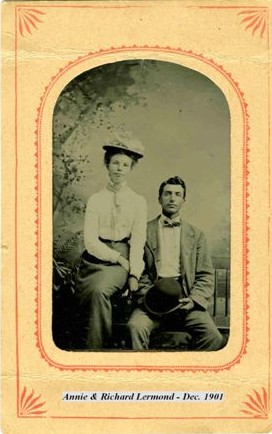 On Christmas Eve, 1901,
Rich and 19-year-old Annie went on a
sleigh ride to Camden, where they were
married by L. D.. Evans, justice of the
peace. It was a crisp, cold moonlit night
as they rode back to Lincolnville, via the
Turnpike, with sleigh bells ringing, to
the Old Town House where a party was
waiting. Rich was so happy to have her as
his bride, that as they danced around, he
picked her up, dancing an Irish jig. On Christmas Eve, 1901,
Rich and 19-year-old Annie went on a
sleigh ride to Camden, where they were
married by L. D.. Evans, justice of the
peace. It was a crisp, cold moonlit night
as they rode back to Lincolnville, via the
Turnpike, with sleigh bells ringing, to
the Old Town House where a party was
waiting. Rich was so happy to have her as
his bride, that as they danced around, he
picked her up, dancing an Irish jig.
The
couple settled in on the hill in the old
Marriner farmhouse. The next year, 1902,
was an unhappy year for the couple.
Grandmother Clark had died before Annie
was born. Annie recalled hearing that Dr.
Neal had made an autopsy on grandmother.
He discovered two tumors, weighing abut
six and four pounds, respectively. He
thought they had caused her demise.
Grandfather
Clark moved up to the hill to live with
the family. He died in January 1902, one
week after Annie and Rich’s wedding. He
was 90 years old.
Rich’s
mother, Mary had been born in Ireland.
Annie loved to hear her Irish accent, and
to listen to Mary and her daughters sing.
Then, Aug. 9, 1902, seven months after
their wedding, Rich’s lively soft-spoken
mother, who had been kicked in the head by
a horse, died at age 59.
One week
later, Rich’s sister, Maud died. She was
29. Two months after Maud’s death, Rich’s
little brother, Frankie died, at age 27.
All three had died of tuberculosis. Rich
was grief-stricken. Theirs had been such a
happy close-knit family.
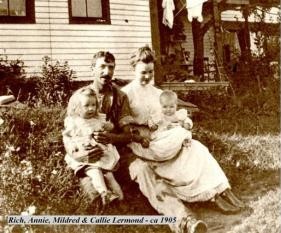 Mildred was born in 1903,
followed by Callie, Mary, Margaret and
Bernice. Callie was named after Mamma and
Mary after Rich's mother. Baby Callie was
born in February 1905. Mildred was born in 1903,
followed by Callie, Mary, Margaret and
Bernice. Callie was named after Mamma and
Mary after Rich's mother. Baby Callie was
born in February 1905.
Two
months later, Mamma died of heart trouble,
at age 51. Mamma had always been there for
Annie, who had been an only child. Mamma
had only been sick a few weeks, when
suddenly she was gone. Mamma had been
active in the Grange, always helping those
who were sick or in need. At her funeral,
nearly every member of the Grange
attended.
After
the Grange Hall burned in 1904, some
members were hesitant to rebuild. Annie
and Papa were among those who vowed to
press on and rebuild. Papa and Rich helped
work on the second hall, while Annie and
the other women prepared meals for the
carpenters. At last, they had the building
up, ready for the plasterers.
Annie
remembered the day, May 25, 1908, when the
phone rang from Lincolnville Centre
phone office, telling everyone on the line
that Tranquility Grange was again burning.
Papa and Rich went down to help fight the
fire, but alas, this hall also was
destroyed. Annie wept. All that work, gone
up in smoke. It was rumored that one of
Annie’s cousins had set the fire.
They
were back to having no hall. In the summer
and early fall of 1908, the Grange cleared
up the debris of the burned Grange site. A
determined group once again hired
carpenters, with much volunteer labor and
materials, and set about to build another
Grange Hall. This time instead of plaster,
they put in beautiful pressed metal walls
and ceilings. The new Grange hall was
ready for use in January of 1909. This
hopefully would be the last Grange Hall
they would have to build.
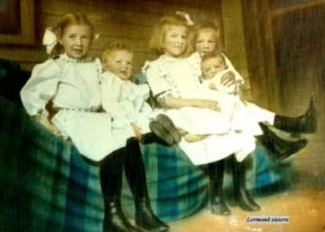 Life was simple
for Rich and Annie on the hill. The family
enjoyed Grange picnics at Oakland Park in
Rockport. It was a happy time when the
Grange families got together, eating,
drinking, with the children playing and
romping in the park. The neighborhood
families also went on group excursions,
complete with picnic lunch. They picked
blueberries to be canned for the winter up
on Stevens Mountain, near home. Life was simple
for Rich and Annie on the hill. The family
enjoyed Grange picnics at Oakland Park in
Rockport. It was a happy time when the
Grange families got together, eating,
drinking, with the children playing and
romping in the park. The neighborhood
families also went on group excursions,
complete with picnic lunch. They picked
blueberries to be canned for the winter up
on Stevens Mountain, near home.
Annie
sewed for her family, making dresses for
the girls, quilts for their warmth and
fancywork for Grange competition at the
fair. She recalled that one time, Rich’s
sister, Kate, had given her bolts of white
material. She had made the girls white
dresses, which they wore with pride to the
Grange picnic at Oakland park.
Dr.
Elmer Gould diagnosed Papa with influenza
in the spring of 1915. Julia was born in
the fall of 1915, delivered by Dr. Gould.
Julia was a beautiful baby, and loved by
Annie, Rich, Papa and all of her sisters.
Papa never really rallied from the flu. He
died in February 1916, at 69 years of age.
Annie and Rich’s baby girl, Julia, died of
pneumonia New Year’s Day, 1917, just over
1 year old. After Papa died, Rich’s
father, who had been alone much since his
wife’s death, moved into the farmhouse
with their family.
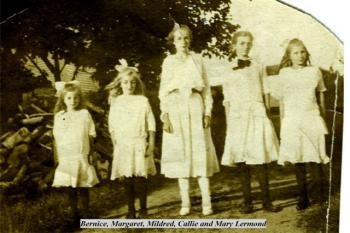 The five Lermond girls were
very attractive. Someone once asked Rich
if he regretted not having boys. Rich’s
reply was, “Where there are girls, there
will be boys!” The five Lermond girls were
very attractive. Someone once asked Rich
if he regretted not having boys. Rich’s
reply was, “Where there are girls, there
will be boys!”
The
Lermond home was a hub of activity, with
relatives coming for the summer from
Massachusetts and from across the country.
Callie
was the first to marry in 1923 to J.
Everett Morse of Belmont. Mildred married
Allen Morton in January 1925, followed by
Mary, who married Everett’s brother, Amon
in March, 1925. Rich and Annie soon had a
growing household of grandchildren.
Rich,
being truly Irish, had a taste for
alcohol, much to the chagrin of Papa, who
did not imbibe in alcoholic beverages,
being an abolitionist. Rich made a smooth
hard cider and vinegar from his apple
trees. He passed his secret recipe for
apple cider to his son-in-law, Amon. He
also made home-brew, an alcoholic drink
made from malt and yeast. This was during
the Prohibition era. Annie was not always
tolerant of his drinking habits.
One
time, she secretly knocked the bung out of
his barrel of brew, letting the
foul-smelling beverage go down the cellar
drain. Rich never knew how the bung
happened to come loose.
Annie
would never forget that Tuesday evening,
Dec. 13, 1927. Annie was clearing up the
supper dishes, when Rich came in to tell
her that he’d started the gasoline engine,
used to generate electrical power for the
lights. He went back to the barn, finding
it all ablaze. While attempting to put out
the fire, he was badly burned on his face
and hands. Neighbors were alerted, coming
to help fight the fire with a bucket
brigade, but it was useless. They lost the
buildings, four horses, 10 cows, and six
hogs. They also lost the crop of hay, the
apples stored from his orchards for
shipping, 100 bushel of dry beans, 450
bushel of potatoes, most of the farm
machinery, and all of the household
furniture, some of which had been in the
family for 150 years, back for five
generations.
Annie
was glad Papa was not here to see the
destruction caused by the fire. The
estimated loss was $10,000, which was
partially insured. They concluded the
gasoline engine had exploded.
In the
excitement of the fire, 16-year-old
Bernice carried her nephew, Allen Jr. down
to the neighbor’s, Lucius and Myrabell
Russ.
Allen
Jr. was a chunky child. Bernice told her
mother how her arms had ached carrying the
heavy child. Margaret, then 17, was
credited with saving a wooden chest of
family photos and certificates which were
stored at the top of the stairs. Rich was
taken to the Camden hospital by neighbors
to tend to his burns. He recuperated at
Mildred and Allen’s apartment in Camden.
The
neighbors and members of the Grange
rallied to rebuild the farm buildings. A
benefit was held by the Grange. Rich heard
of a barn on Spring Brook Hill in Camden.
He, his sons-in-law and neighbors
dismantled the barn, hauling it back to
Millertown where they reassembled it.
Kindly neighbors and Grange members
donated some livestock, and household
furniture. Annie and Rich lived in the
room over the cooper shop until the house
was completed enough to live in. Life
slowly returned to normal.
Mildred
and Allen worked in the Woolen Mill in
Camden, leaving Allen Jr. to attend Miller
School, living with his grandparents, Rich
and Annie. In May 1936, Allen Jr. became
sick. He was taken to the hospital in
Rockland, X-rayed, followed by surgery
from which he never recovered. He died May
18, 1936, aged 9 years and 8 months, of
typhoid pneumonia. Annie, and especially
Rich, grieved for the boy who had always
lived with them.
One year
later, on a hot day, June 13, 1937, the
family was called together to search for
Rich. He had not been well. He was
scheduled for an operation on his back at
Waldo County Hospital in Belfast. He had
gone out hunting and had not returned. The
family spread out across the fields,
searching for him. Three hours later, he
was found on a stone wall in the back
field. It appeared that his foot became
caught between two logs on the wall,
causing him to fall upon his gun, which
discharged, killing him.
Rich was
nearly 58 years old. He had always been a
prominent citizen of the town, a farmer
and a cooper. He was an active member of
the Grange, and belonged to King David’s
Masonic Lodge. Whenever there was a need
in the community, Rich would be there with
baskets of food, hay for animals, or
whatever the need might be.
Annie
wept as she recalled her loss. Life was
lonesome without Rich. Callie, Everett and
the girls moved in with her to help keep
up the farm. Mildred and Allen had taken
over Grandfather Lermond’s farm across the
woods. One day, as Everett was leaving to
go to work, he met Allen leading his
cattle up over the hill to the barn.
Mildred and Allen moved into the big old
farmhouse with them. Callie, Everett and
the girls soon purchased the old Fredson
farm up the road.
In the
fall of 1941, Mary and Amon’s little
11-year-old daughter, Janette became sick
and needed surgery for a serious sinus
disease. Dr. Carl Stevens of Belfast
performed the surgery, but Janette died in
October of that year.
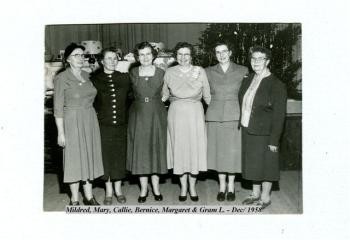 Around that time, Annie
moved into Aunt Frances Churchill’s home
down by the cemetery, where she lived for
a few years. Bernice and Ivan lived next
door. Annie tended their young children
while Bernice worked. Harry Dole, Aunt
Carrie’s third husband, who was widowed,
lived next door in Grandfather Clark’s old
home. Harry, who was Annie's second
cousin, visited Annie several evenings a
week. They enjoyed sitting on the porch
and chatting about family and the
happenings of the day in the evening
hours. Around that time, Annie
moved into Aunt Frances Churchill’s home
down by the cemetery, where she lived for
a few years. Bernice and Ivan lived next
door. Annie tended their young children
while Bernice worked. Harry Dole, Aunt
Carrie’s third husband, who was widowed,
lived next door in Grandfather Clark’s old
home. Harry, who was Annie's second
cousin, visited Annie several evenings a
week. They enjoyed sitting on the porch
and chatting about family and the
happenings of the day in the evening
hours.
Margaret
and Bob lived across from Lucius and
Myrabell Russ. In 1951, Bernice opened a
lunch stand at the head of Megunticook
Lake. Annie enjoyed helping Bernice at
Sunset Cove, greeting old friends and
neighbors who she’d known all of her life.
In her
sunset years, when she was unable to work,
Annie returned to the farm where she’d
been born. Mildred had an apartment made
for her upstairs in the farmhouse that
Rich had built.
Annie
had seen so much in her nearly 87 years.
Now she was in an unfamiliar room. She
thought she heard Rich’s familiar loving
voice as an angel held her hand. The nurse
was coming back to sit her in the sun.
There was no need now. The cares of life
fell off, as Annie reached for Rich’s
hand, stepping into her new life, with all
of those whom she had loved so dearly.
Annie
had been called Gram Lermond by her many
grandchildren and great-grandchildren. She
died in Rockland on April 13, 1969. She
was buried in Union Cemetery with Rich,
their baby daughter, Julia, Papa, Mamma,
Little Allen, Janette, and all the
generations that had gone before her,
including her great-grandparents who had
been among the first settlers to come to
the town of Lincolnville, building in the
back settlement. Annie had
been the fifth generation to live on the
land deeded to her forebears.
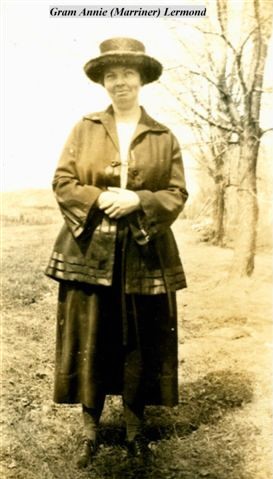
Circa 1969, the farm was
sold by Mildred and Allen, so that the only
memories of the Marriner generations are in
the hearts of her descendants, and in the
Union Cemetery.
|


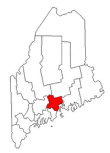
 After all, Mamma had been
the youngest daughter of the 11 children
of John and Mary Ann (Clark) Clark. Even
though Papa also had been an only child,
his great-grandfather Naler Mariner, had
been among the early settlers of the town
of Lincolnville, then called New Canaan.
Naler had built a log cabin behind the
present house. Papa had cousins galore,
both in the neighborhood and spread out
across America.
After all, Mamma had been
the youngest daughter of the 11 children
of John and Mary Ann (Clark) Clark. Even
though Papa also had been an only child,
his great-grandfather Naler Mariner, had
been among the early settlers of the town
of Lincolnville, then called New Canaan.
Naler had built a log cabin behind the
present house. Papa had cousins galore,
both in the neighborhood and spread out
across America.  On Christmas Eve, 1901,
Rich and 19-year-old Annie went on a
sleigh ride to Camden, where they were
married by L. D.. Evans, justice of the
peace. It was a crisp, cold moonlit night
as they rode back to Lincolnville, via the
Turnpike, with sleigh bells ringing, to
the Old Town House where a party was
waiting. Rich was so happy to have her as
his bride, that as they danced around, he
picked her up, dancing an Irish jig.
On Christmas Eve, 1901,
Rich and 19-year-old Annie went on a
sleigh ride to Camden, where they were
married by L. D.. Evans, justice of the
peace. It was a crisp, cold moonlit night
as they rode back to Lincolnville, via the
Turnpike, with sleigh bells ringing, to
the Old Town House where a party was
waiting. Rich was so happy to have her as
his bride, that as they danced around, he
picked her up, dancing an Irish jig.
 Mildred was born in 1903,
followed by Callie, Mary, Margaret and
Bernice. Callie was named after Mamma and
Mary after Rich's mother. Baby Callie was
born in February 1905.
Mildred was born in 1903,
followed by Callie, Mary, Margaret and
Bernice. Callie was named after Mamma and
Mary after Rich's mother. Baby Callie was
born in February 1905.  Life was simple
for Rich and Annie on the hill. The family
enjoyed Grange picnics at Oakland Park in
Rockport. It was a happy time when the
Grange families got together, eating,
drinking, with the children playing and
romping in the park. The neighborhood
families also went on group excursions,
complete with picnic lunch. They picked
blueberries to be canned for the winter up
on Stevens Mountain, near home.
Life was simple
for Rich and Annie on the hill. The family
enjoyed Grange picnics at Oakland Park in
Rockport. It was a happy time when the
Grange families got together, eating,
drinking, with the children playing and
romping in the park. The neighborhood
families also went on group excursions,
complete with picnic lunch. They picked
blueberries to be canned for the winter up
on Stevens Mountain, near home.  The five Lermond girls were
very attractive. Someone once asked Rich
if he regretted not having boys. Rich’s
reply was, “Where there are girls, there
will be boys!”
The five Lermond girls were
very attractive. Someone once asked Rich
if he regretted not having boys. Rich’s
reply was, “Where there are girls, there
will be boys!”  Around that time, Annie
moved into Aunt Frances Churchill’s home
down by the cemetery, where she lived for
a few years. Bernice and Ivan lived next
door. Annie tended their young children
while Bernice worked. Harry Dole, Aunt
Carrie’s third husband, who was widowed,
lived next door in Grandfather Clark’s old
home. Harry, who was Annie's second
cousin, visited Annie several evenings a
week. They enjoyed sitting on the porch
and chatting about family and the
happenings of the day in the evening
hours.
Around that time, Annie
moved into Aunt Frances Churchill’s home
down by the cemetery, where she lived for
a few years. Bernice and Ivan lived next
door. Annie tended their young children
while Bernice worked. Harry Dole, Aunt
Carrie’s third husband, who was widowed,
lived next door in Grandfather Clark’s old
home. Harry, who was Annie's second
cousin, visited Annie several evenings a
week. They enjoyed sitting on the porch
and chatting about family and the
happenings of the day in the evening
hours. 